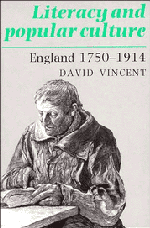Summary
The tenth of Joseph Lawson's Letters to the Young on Progress in Pudsey was entitled ‘Superstition the Child of Ignorance’. ‘In proportion as people are deprived of knowledge and are ignorant of the causes of what they constantly see and hear’, he began, ‘their imagination is let loose and their reason being weak, they become a prey to every false rumour or popular prejudice and delusion.’ The dichotomy between knowledge and superstition has been at the heart of movements for mass education from the late eighteenth century to the present day. In 1980 Unesco set out the objective of a mass literacy campaign: ‘The knowledge which should be created here is first of all self-knowledge. In practice it is self emancipation which includes emancipation from superstition, apathy and fatalism. It is the creation of a man who understands his physical environment correctly and is willing to conquer and develop it.’ A command of the tools of communication would lead to a command of the natural world. The double absence of control was at once a measure and a cause of the divide between advanced and backward countries, and between polite and popular cultures within societies. The early folklorists claimed to be the first to discover the true state of mind of the uneducated.
- Type
- Chapter
- Information
- Literacy and Popular CultureEngland 1750–1914, pp. 156 - 195Publisher: Cambridge University PressPrint publication year: 1989

